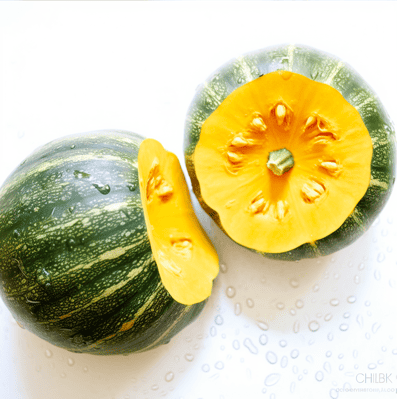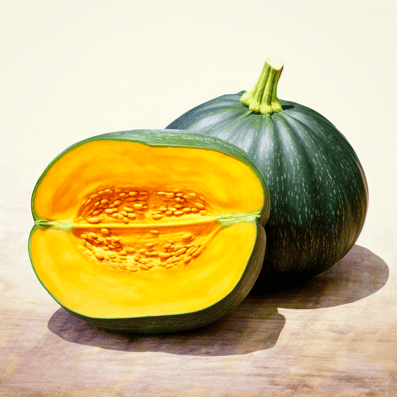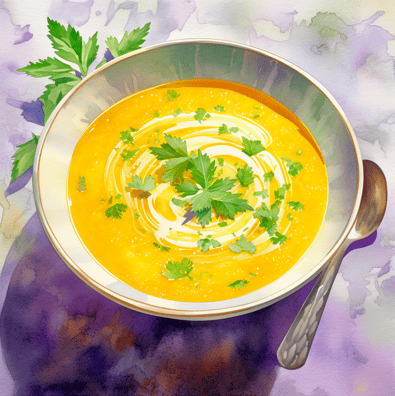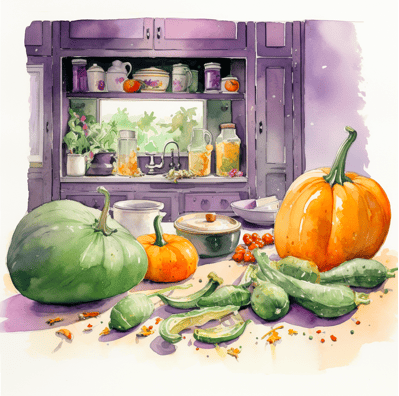
Don’t want to read the whole post?
Kabocha vs Buttercup squash: both are nutritious and versatile, perfect for a healthy diet. Kabocha has a denser flesh and is slightly less sweet, while Buttercup is creamier and has a sweeter taste. Both are rich in vitamins and fibre, supporting overall health and beauty.
ABOUT ME
Be beauty. Be plant-based!
As a former Registered Nurse and avid plant-muncher, I’m in love with how simple plant-based foods make it easy to be beautiful.

You’ll also love:
Zucchini vs Eggplant: The Ultimate Veggie Showdown!
Apricots vs Nectarines: Comparing The Sweet And Succulent
Dive through a comparison of two popular varieties of winter squashes, Kabocha vs Buttercup squash. In this guide, you’ll discover their unique characteristics and how they can enrich your plant-based diet, contributing to your vibrant health and beauty. Let’s delve into the differences and similarities of these two delightful squashes.
Kabocha vs Buttercup Squash
Both of these squashes belong to the Cucurbita maxima species, a group known for its diverse and flavourful members. Although they share a family tree, these two squash varieties are not the same.
Kabocha Squash
Kabocha squashes stand out with their dark green skin and thick skin, housing a dense dark yellow-orange flesh that’s a testament to their nutrient richness. Kabochas are often celebrated for their unique sweet flavour and nutty flavour.

What is another name for kabocha squash?
As a staple in many Japanese dishes, its nickname is Japanese pumpkin.
Buttercup Squash
Kabocha’s cousin, the Buttercup squash, presents a striking bright orange interior beneath a smooth texture, offering a chestnut-like flavour that complements many dishes.

Is buttercup the same as kabocha squash?
No. Buttercup squash, with its slightly sweeter taste and creamier texture, makes a versatile addition to a range of culinary creations.
What is buttercup squash also called?
Buttercup squash is not commonly known by another specific name. It is usually referred to simply as ‘Buttercup squash’.
Culinary Uses and Substitutions
In the kitchen, both of these squashes are versatile stars. They both lend a sweet flavour as well as a nutty flavour to dishes, making them ideal for many recipes from creamy soups to baked delights.

Can you substitute buttercup squash for kabocha?
Yes, you can interchange Buttercup squash and Kabocha in recipes. However you may notice subtle differences in sweetness and texture.
What squash is closest to kabocha squash?
The squash most similar to Kabocha squash in taste and texture is Buttercup squash. Both have a sweet and nutty flavour, though Kabocha is generally a bit sweeter. They are often used interchangeably in recipes due to their similar characteristics
What is a good substitute for buttercup squash?
If you’re out of Buttercup squash, consider using similar types of squash like blue Hubbard squash or delicata squash. Their unique flavours and textures offer delightful variations to your favorite squash dishes. The choice of substitute can depend on the specific dish and the desired taste and texture.
Is Kabocha squash better than butternut squash?
Kabocha squash has a sweeter and nuttier flavour with a denser, creamier texture, making it ideal for roasting or pureeing.
Butternut squash, with a milder taste and softer, more fibrous texture, is versatile in soups, stews, and casseroles. Kabocha’s thin, edible skin simplifies preparation, while butternut squash’s thicker skin is usually removed before cooking

Kabocha squash and butternut squash have different nutritional profiles, making them beneficial in various ways. Kabocha is lower in calories and carbohydrates but higher in vitamins A and C, compared to butternut squash, which has more vitamin E. Kabocha’s lower glycemic index makes it a better choice for blood sugar management. Both are great sources of potassium. In terms of overall nutrient content, kabocha has higher levels of certain minerals and vitamins. Your choice between them can depend on specific dietary needs and preferences.
Nutritional Benefits: Kabocha vs Buttercup Squash
Both Buttercup squash and Kabocha squash are treasures in a health-conscious diet, each boasting an array of vitamins and minerals. They are particularly high in vitamin C, essential for skin health and immune function.
Notably, Kabocha is recognised for its low glycemic index, making it a more suitable choice for those managing blood sugar levels compared to other sweet squashes like the sweet potato squash.
This characteristic also sets it apart from other varieties like butternut squash and spaghetti squash, which have different nutritional profiles.
Health Benefits
Embracing Buttercup and/or Kabocha squash as a regular part of your healthy diet is a great decision, and means you’re enriching your body with essential nutrients. Both are known for their high vitamin C content, beneficial for skin health and immune support.
Kabocha squash is particularly celebrated for its rich fibre content and significant levels of antioxidants, making it a heart-healthy choice that promotes digestive well-being. On the other hand,
Buttercup squash, with its creamy texture and sweet taste, is not only a delight to the palate but also a great source of vitamins and minerals, supporting overall health and wellness.
Selecting and Storing Your Squash
Choosing and storing these squashes correctly ensures you get the best taste and nutritional value. Look for squashes with intact skin color and a smooth texture. They should be stored in a dark place or a dry place to maintain their quality.
When selecting Buttercup squash, you might notice a dark bottom – this is normal and doesn’t affect the squash’s quality. Both varieties should be firm to the touch, indicating their freshness and readiness for your delicious recipes.
Alternative Names and Similar Varieties
While Kabocha is widely known as the Japanese pumpkin, it’s not to be confused with the common pumpkin used in pies and Halloween carvings. The closest relatives to Kabocha in terms of flavour and culinary use include sweet dumpling squash, turban squash, and to some extent, the Buttercup squash. Each of these varieties, while similar, brings its distinct taste and texture to the table, enriching the diversity of squash-based recipes.

When compared to different varieties of winter squash like butternut squash and spaghetti squash, Kabocha (or Japanese squash) stands out with its dark green skin and a flavour profile that’s both sweet and nutty, somewhat akin to a blend of sweet potatoes and pumpkin. This makes it an excellent choice for those who enjoy a unique flavour in their dishes.
Conclusion: Kabocha vs Buttercup Squash
Incorporating Kabocha and Buttercup squash into your meals is not only a step towards a healthier lifestyle but also a journey into a world of delightful flavours and textures. Whether you’re making creamy soups, roasting them for a side dish, or exploring new recipes, these squashes offer versatility and nutrition. Remember, each type of squash brings its unique qualities to your table, making every dish a new adventure in taste. So, beautiful, as you continue your quest for health and happiness, don’t forget to explore the vibrant and nutritious world of Kabocha vs Buttercup squash.
FAQ : Kabocha vs Buttercup Squash
What is Kabocha squash in Australia?
In Australia, Kabocha squash is also known as Japanese pumpkin. It’s recognised for its sweet flavour and dense texture, making it popular in various dishes.
Is buttercup squash the same as butternut squash?
No, buttercup squash and butternut squash are different. Buttercup squash is smaller, with a denser and creamier texture, while butternut squash is larger, with a sweeter taste and softer texture.
Can I substitute buttercup squash for kabocha in recipes?
Yes, buttercup squash can often be substituted for kabocha due to their similar flavours and textures, though slight differences in sweetness and moisture content may be noticeable.
How do I store kabocha squash?
Store kabocha squash in a cool, dry place. It can last for several weeks to months if kept away from direct sunlight and moisture.
What are the health benefits of eating kabocha squash?
Kabocha squash is low in calories, rich in vitamins A and C, and has a low glycemic index, making it great for blood sugar control and overall health.
Are kabocha and buttercup squash suitable for a weight-loss diet?
Yes, both are low in calories and high in fibre, making them excellent choices for weight loss and healthy eating plans.